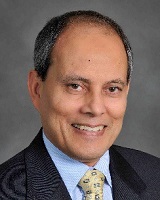Webinar: The Smart City Building Blocks & Their Synergy with Smart Villages
Webinar. Free registration is required. Link to the webinar will be sent to the registered individuals
Abstract: A smart city relies on widely distributed smart devices to monitor the urban environment in real-time, collects information for intelligent decision making, and facilitates various services to improve the quality of urban living. The distributed network of intelligent sensor nodes, as well as data centers/clouds where sensor data are stored and shared, constitutes a smart city infrastructure. Smart cities address urban challenges such as pollution, energy efficiency, security, parking, traffic, transportation, and others by utilizing advanced technologies in data gathering and communications interconnectivity via the Internet. It provides real time and remote monitoring for different aspects of data management in areas such as transportation, communication, video surveillance, and sensors distributed throughout the city. Simultaneously, the Smart City building blocks like education, telemedicine, health care, IT applications, pollution management, etc. can be deployed in the IEEE Smart Village initiative to have a greater impact on the rural population throughout the world. through reliable electricity and internet connectivity.
Date and Time
Location
Hosts
Registration
-
 Add Event to Calendar
Add Event to Calendar
- Please note, this is an online webinar All registered attendees will receive an email notice on how to sign in to the webinar
- Waterloo, Ontario
- Canada
- Contact Event Host
- Co-sponsored by IEEE Ottawa Section PES, IMS, RRS/PELS, ComSoc/CESoc/BTS, EA, and Algonquin College IEEE Student Branch
Speakers
 Dr. Saifur Rahman of Advanced Research Institute, Virginia Tech
Dr. Saifur Rahman of Advanced Research Institute, Virginia Tech
The Smart City Building Blocks & Their Synergy with Smart Villages
A smart city relies on widely distributed smart devices to monitor the urban environment in real-time, collects information for intelligent decision making, and facilitates various services to improve the quality of urban living. The distributed network of intelligent sensor nodes, as well as data centers/clouds where sensor data are stored and shared, constitutes a smart city infrastructure. Smart cities address urban challenges such as pollution, energy efficiency, security, parking, traffic, transportation, and others by utilizing advanced technologies in data gathering and communications interconnectivity via the Internet. It provides real time and remote monitoring for different aspects of data management in areas such as transportation, communication, video surveillance, and sensors distributed throughout the city. Simultaneously, the Smart City building blocks like education, telemedicine, health care, IT applications, pollution management, etc. can be deployed in the IEEE Smart Village initiative to have a greater impact on the rural population throughout the world. through reliable electricity and internet connectivity.
Biography:
Prof. Dr. Saifur Rahman is the founding director of the Advanced Research Institute (www.ari.vt.edu) at Virginia Tech, USA, where he is the Joseph R. Loring Professor of Electrical and Computer Engineering. He also directs the Center for Energy and the Global Environment (www.ceage.vt.edu). He is a Life Fellow of the IEEE and an IEEE Millennium Medal winner. He was the founding Editor-in-Chief of the IEEE Electrification Magazine and the IEEE Transactions on Sustainable Energy. In 2006, he served on the IEEE Board of Directors as the Vice President for Publications. He is a Distinguished Lecturer for the IEEE Power & Energy Society (PES) and has lectured on renewable energy, energy efficiency, smart grid, electric power system operation and planning, etc. in over 30 countries. He was IEEE Power and Energy Society President 2018-2019 and is now a candidate for IEEE President-Elect 2021.
He chaired the US National Science Foundation Advisory Committee for International Science and Engineering, 2010-2013. He conducted several energy efficiency projects for Duke Energy, Tokyo Electric Power Company, US National Science Foundation, US Department of Defense, State of Virginia and US Department of Energy.
Address:Arlington, Virginia, United States
Agenda
DATE: Wednesday, August 12, 2020.
TIME: Webinar: 6:30 p.m. – 7:30 p.m.
Admission: Free. Registration required.
For any additional information, please contact sahar.azad@uwaterloo.ca.

